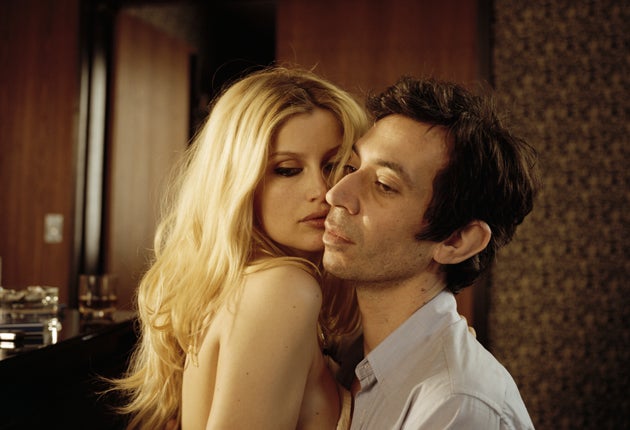Gainsbourg, Joann Sfar, 135 mins (15)
The eventful, sometimes scandalous, life of Serge Gainsbourg is seen through a cartoonish and smoky filter in what is more a tribute to the French singer-songwriter than a standard biopic

For years, the British public was vaguely aware of Serge Gainsbourg as a leering pop Svengali who had somehow lured an English gamine into the recording studio for the proverbial steamy romp (his hit collaboration with Jane Birkin, "Je t'aime ... moi non plus", banned by UK radio but the soundtrack to many a sixth-form disco knee-trembler).
Later, Gainsbourg's notoriety spread as the man who had burned a 500 franc note and propositioned Whitney Houston on live TV (not on the same night; that would have been ostentatious). More recently, hipster admirers such as Jarvis Cocker have helped to spread his acclaim as a songwriter and performer. But to really understand Gainsbourg's role as provocateur, scandalist and cultural axiom, perhaps you need to be French – or a French cartoonist.
Comic-book artist Joann Sfar has made a good stab at encapsulating the richness and peculiarity of his subject, in a film originally subtitled vie héroïque, "a heroic life", and dubbed un conte, "a fairy tale". Gainsbourg is best described as a fantasy, and effectively suggests that – as with so many showbiz legends – the life itself was a fantasy, a stroke of artistic creation that was as much part of the oeuvre as the output proper.
The Gainsbourg seen here is not merely a self-creation, but a knowing feat of intellectual dandyism in the Baudelaire tradition. In the film, the transformation is accomplished by the hero's splitting himself into a "real" self (a shy painter manqué originally named Lucien Ginsburg) and a cartoonish fop, incarnated by Lucien's alter ego and satanic tempter (Doug Jones), a lanky, long-nosed, snaky-fingered puppet figure. Sfar emphasises and celebrates Gainsbourg's Jewishness: he suggests that France got the pop hero it deserved in a man who constantly reminded the nation of its guilty history of anti-Semitism. His provocation begins as a child of the Occupation: when it is announced that French Jews must wear a yellow star, little Lucien is the first to demand his, sporting it like a sheriff's badge. Throughout his career, he revelled in the image of a tobacco-tainted, baggy-eyed poète maudit ploughing a sexual path through Gallic pop culture's maidenhood.
His love life, seen in this light, was a long-term performance project, and Sfar is enraptured by Gainsbourg's formidable pulling power. Brigitte Bardot is the swankiest in a whole parade of showbiz goddesses. She's first seen stalking up a corridor with boots and Afghan hound; for an additional iconic charge, Sfar casts supermodel Laetitia Casta, but she's too clean and self-consciously prestigious a presence to catch properly the transcendentally sluttish allure of Bardot at her Sixties peak. More convincing is an outrageously vampish Anna Mouglalis as Juliette Gréco, reigning over the Gothic boudoir of a Rive Gauche black widow. A rare element of reality is brought by Jane Birkin, down to earth, engagingly bolshy and, the film notes, the woman who played Pygmalion to Serge, rather than vice versa. She's played by Lucy Gordon, who doesn't quite capture Birkin's posh spaciness, but whose very physical, earthy nerviness at last brings the film a weight that is not all Gainsbourg's. That Gordon killed herself after the film's completion brings a poignancy, but it's a strong performance, and you can't help wondering what she might have gone on to achieve.
Selectively dipping into the songbook, Sfar makes a strong case for Gainsbourg's musical and verbal brilliance. In fact, when it comes to the notorious reggae version of "La Marseillaise" – which scandalised the French right – it almost seems a shame that the conceptual artist finally eclipsed the artisan of the sublime "La Javanaise". There are two particularly choice musical moments. One is when Gainsbourg proposes to write "a dirty song" for gauche yé-yé singer France Gall (a very droll Sara Forestier), who simply doesn't get his bouncy nudge-nudge number about a girl who likes lollipops. The other is an encounter with another louche legend of chanson, songwriter-novelist Boris Vian, with the two men pooling drinking songs. (Singer Philippe Katerine looks nothing like Vian, but a lot like André Breton, and what a singalong Gainsbourg could have had with him.)
Sfar goes a little overboard with his fabulist tendencies, and the puppet Serge way outstays its welcome. What holds the film together is Eric Elmosnino's lead. He's visually uncanny with his goofy eyes and quizzical lip, but above all, he carries off his performance with mischievous zest, maintaining a sort of gleeful, stunned innocence through Gainsbourg's incarnations: from young pipe-smoking aesthete, through the floppy Jewish Jagger of the Sixties, to the haggard débauché of the latter years.
Overall, Sfar bowdlerises his man somewhat, or at least steers away from some of the scandal – he gives Gainsbourg's life a tender happy ending, and skates around the provocation of "Lemon Incest", his duo with daughter Charlotte. The result is a "heroic life" rather than a real life, but Sfar is at least explicit about his intentions. Uneven but lively, Gainsbourg is less a biopic, more a tribute musical, but an enjoyable shadow show nonetheless.
Next Week:
Nicholas Barber spends Knight and Day with Hollywood giants Tom Cruise and Cameron Diaz
Subscribe to Independent Premium to bookmark this article
Want to bookmark your favourite articles and stories to read or reference later? Start your Independent Premium subscription today.

Join our commenting forum
Join thought-provoking conversations, follow other Independent readers and see their replies